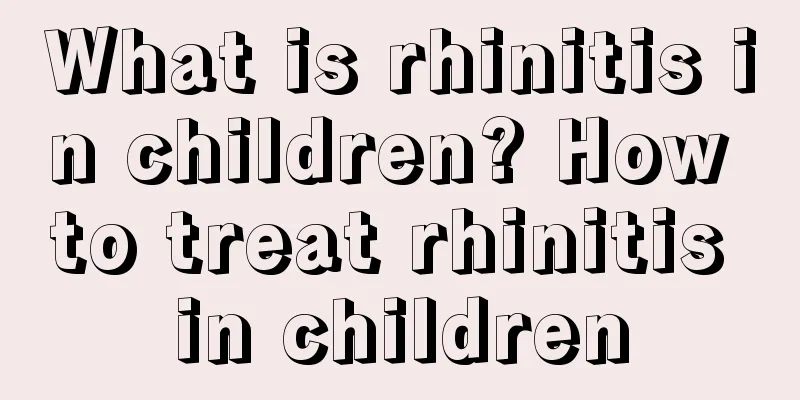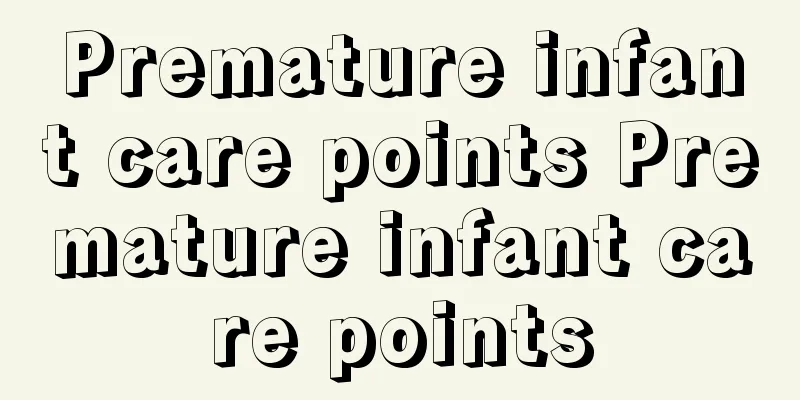What is rhinitis in children? How to treat rhinitis in children

|
Nowadays, children generally have poor physical constitutions and may be infected with some diseases if they are not careful. Children's rhinitis is a common disease among young children nowadays, and it is somewhat different from adult rhinitis. What is rhinitis in children?The baby's own physical reasons 1. The baby has some nasal diseases: Some nasal diseases can cause rhinitis if left untreated for a long time, such as deviated nasal septum, hypertrophy of the middle turbinate, nasal polyps, allergic rhinitis, foreign bodies in the nasal cavity, etc. 2. Most cases of rhinitis in children are allergic rhinitis, which may be caused by inhaled allergens and ingested allergens. 3. The baby's own resistance is poor, such as excessive fatigue, cold and dampness, malnutrition, leading to a cold. If the cold cannot be cured after a week of treatment, it will be delayed into rhinitis. 4. Babies may suffer from complications such as tonsillitis, adenoids hypertrophy, pharyngitis, etc., which may lead to rhinitis. 5. Improper use of nasal medication or excessive use for too long can cause drug-induced rhinitis: This is mainly because parents use their own medicines to treat their babies. Therefore, when parents find that their babies have rhinitis, they should not blindly use medication to treat their children to avoid drug-induced rhinitis. It is recommended to go to an ENT hospital for diagnosis and treatment and follow the doctor's advice. Baby's external environment 1. Failure to promptly seek treatment after a cold: Children think they are young and in good health, and feel that a cold does not require treatment. However, one of the sequelae of a cold is rhinitis. 2. Living environment causes: Students stay in classrooms for a long time, the air cleanliness is poor, and long-term stimulation from harmful substances such as dust causes rhinitis. 3. No early treatment for rhinitis: Children are under great academic pressure and delay treatment after suffering from rhinitis, which progresses from acute nasal congestion to chronic simple rhinitis, and then to hypertrophic rhinitis, and finally develops into rhinitis. How to treat rhinitis in children1. Treatment with Chinese medicine Traditional Chinese medicine can play a relatively good therapeutic effect when dealing with children's rhinitis. The most commonly used Chinese medicine that can help us treat children's rhinitis is rhinitis ointment. Children with rhinitis can achieve the effect of treating rhinitis by applying this ointment externally. This medicine can not only treat children's rhinitis, but also achieve good results when dealing with other types of rhinitis. 2 Desensitization treatment Children with rhinitis can also use desensitization treatment to deal with the disease. Desensitization treatment has been developed for a long time and its efficacy is very worthy of our recognition. Children with rhinitis caused by allergic reasons can achieve the effect of fundamentally curing the disease after using desensitization treatment. 3 Drug treatment Local drug treatment is also a treatment method for children's rhinitis. Children with rhinitis can effectively relieve the nasal congestion symptoms caused by rhinitis by using ephedrine solution topically, allowing some secretions in the nasal cavity to flow out more smoothly. 4 Anti-infection treatment The treatment of childhood rhinitis also includes anti-infection treatment. We can use ribavirin, an antiviral drug, to treat childhood rhinitis. Children with rhinitis combined with bacterial infection can also achieve the purpose of treating the disease by using antibiotics. Symptoms of rhinitis in childrenChildren's rhinitis has three different symptoms 1. Chronic rhinitis in children Characterized by cold nose and loss of smell. Chronic simple rhinitis relieves nasal congestion during daytime activities, but worsens at night and when sitting quietly. When lying on one side, the lower nasal cavity is blocked, and the upper nasal cavity is well ventilated. When lying on the other side, nasal congestion appears in the other nasal cavity. The nasal discharge is mucous, often accompanied by headache, dizziness, loss of smell, etc. Chronic hypertrophic rhinitis is mostly persistent nasal congestion, and the nasal discharge is mucous or mucopurulent, and tinnitus, hearing loss, headache, insomnia, mental depression, etc. may occur. 2. Acute rhinitis in children At the onset of the disease, there is mild chills and fever, general discomfort, burning sensation in the nasopharynx, dryness, itching, and sneezing in the nose. After 1 to 2 days, there is gradual nasal congestion, a large amount of clear nasal discharge, decreased sense of smell, and headache. After 3-4 days, due to secondary infection, the secretions turn into yellow purulent nasal discharge that is difficult to blow out, and the nasal congestion becomes more severe. If there are no complications, it will return to normal in about 1 week. 3. Allergic rhinitis in children The clinical features of allergic rhinitis are recurrent episodes of nasal itching, sneezing, clear nasal discharge, and pale nasal mucosa during attacks, which may occur seasonally or year-round. The dangers of rhinitis in childrenNasal congestion, snoring at night Due to long-term and severe nasal congestion symptoms, children have difficulty breathing, which may lead to the occurrence of sleep apnea syndrome. Severe lack of oxygen during sleep, if the condition is not controlled in time, may induce cerebral infarction, sudden heart attack, etc. Some patients may even suffer sudden death at night. Repeated attacks of rhinitis may lead to serious complications such as sinusitis Because the five senses of the human body are closely interconnected through the respiratory tract, blood circulation, bone connections, Eustachian tubes, etc., if chronic rhinitis persists, the inflammation will spread slowly and cause allergic chronic rhinitis, nasal polyps, nasal septum deviation, etc. This series of nasal diseases will then slowly evolve into otitis media, or pharyngitis, etc., and these health-threatening diseases will also follow. Affects appearance If a child suffers from rhinitis, it can easily affect his appearance. Rhinitis can cause nasal congestion, forcing the child to breathe through the mouth. Long-term mouth breathing can cause the lips to become thicker, the teeth to protrude outward, the nose to become flat, the hard palate to become high and arched, and the teeth to become uneven, forming a "rhinitis face" and making the appearance ugly. Affects intelligence If a child's rhinitis develops into chronic rhinitis, it will also affect the child's intelligence. It can spread to the surrounding sinuses, causing sinusitis, headaches, and memory loss. At the same time, chronic rhinitis causes nasal stenosis and affects ventilation, which can cause incomplete expansion of the lungs and reduce oxygen intake, leading to long-term chronic hypoxia in the body, affecting the normal development of the brain and affecting intelligence. |
<<: What is a doula birth like? The whole process of a doula birth
>>: Can babies with eczema be vaccinated? Is it necessary for babies to get imported vaccines?
Recommend
How to promote your baby's intellectual development and physical coordination
If babies find sounds interesting, dance with joy...
A mother’s personal experience: How important is a child safety seat?
In order to save trouble, many young parents usua...
How long after a normal birth can you have a second child? What is the best age?
The two-child policy was fully implemented in 201...
Does the painless delivery injection have any side effects? The pros and cons of the painless delivery injection
With the development of medical technology, the w...
What material is the best for baby bottles?
Parents usually worry about their baby's heal...
Why is my baby's hair growing unevenly? What can I eat to make my baby's hair darker?
When a baby is born, his hair is very sparse. Aft...
At what age can babies eat fruit puree? Which brand of fruit puree is good?
Usually mothers know that babies need to add comp...
What factors will affect your baby's vision? 8 factors to pay attention to
Eyes are the windows to the soul and need our goo...
How do women get through the grief period after failed pregnancy?
Some sisters don’t know how to face it after the ...
Is it selfish for children not to share? How can we help children develop a sense of sharing?
In the eyes of mothers, it is a great advantage f...
Can pregnant women eat hawthorn? What are the harms of eating hawthorn for pregnant women?
Hawthorn is a very common food. It tastes sweet a...
What are the symptoms of corpus luteum insufficiency? What are the effects of corpus luteum insufficiency?
Insufficient corpus luteum can lead to infertilit...
What complementary foods are good for babies with diarrhea? Can babies with diarrhea still eat complementary foods?
What complementary food is good for babies with d...
Is postpartum yoga useful? Can postpartum yoga help you lose weight?
Yoga is a sport that cultivates femininity and gr...
Is it useful for babies to eat DHA when they speak late? The key period for babies to supplement DHA
Many mothers like to give their babies various ca...









